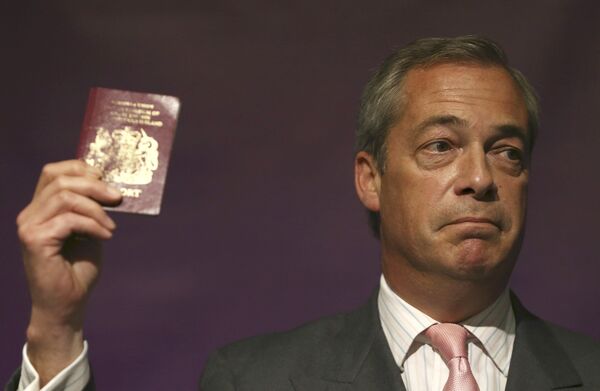Meant to encapsulate the last 12 months of language and culture, Oxford Dictionaries said that this year's offering reflects the public trend where appeals to emotion and gut instinct are more influential than objective facts.
Brexit, President-elect Donald Trump — 2016 may have knocked many people for six, even appearing surreal at times.
But now Oxford Dictionaries has an explanation. Truth it seems, is so last year.
In 2016, it's become all about perception and feelings, especially in politics.
Casper Grathwohl, President of Oxford Dictionaries, said in a statement sent to Sputnik:
"It's not surprising that our choice reflects a year dominated by highly-charged political and social discourse. Fueled by the rise of social media as a news source and a growing distrust of facts offered up by the establishment, post-truth as a concept has been finding its linguistic footing for some time."
"We first saw the frequency really spike this year in June with buzz over the Brexit vote and again in July when Donald Trump secured the Republican presidential nomination," Mr. Grathwohl added.
Post-truth is the Oxford Dictionaries Word of the Year 2016. Find out more: https://t.co/jxETqZMxsu pic.twitter.com/MVMuMyf83K
— Oxford Dictionaries (@OxfordWords) November 16, 2016
For those hoping that 2016's emotional roller coaster may now calm down, Mr. Grathwohl has some bad news.
"Given that usage of the term hasn't shown any signs of slowing down, I wouldn't be surprised if post-truth becomes one of the defining words of our time."
The new buzzword at the moment is "post-truth", if that isn't the closest we got to Orwell's 1984 Newspeak I don't know what is.
— Goncalo Viana (@goncalo_viana) November 17, 2016
A team of editors, lexicographers, marketing, and publicity staff whittled down this year's winner from a shortlist that also included:

— Alt-right: an ideological grouping associated with extreme conservative or reactionary viewpoints, characterized by a rejection of mainstream politics and by the use of online media to disseminate deliberately controversial content.

Oxford Dictionaries cites the first use of "post-truth" in a 1992 essay by the late Serbian-American playwright Steve Tesich, in The Nation magazine.
Reflecting on the Iran-Contra scandal and the Persian Gulf War, Tesich lamented that "we, as a free people, have freely decided that we want to live in some post-truth world."
NEW! Learn how to unlearn with compulsory de-education classes (1976). More info: https://t.co/P0gC0ne0AQ #PostTruth-ism is nothing new. pic.twitter.com/zR1OxZ1m06
— Scarfolk Council (@Scarfolk) November 17, 2016


